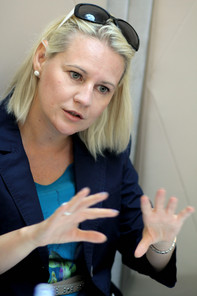Overview
Recommendations
Next Steps
Social media
Leading outside the line organization
Fostering autonomy, responsibility, and empowerment: projects are increasingly turning into opportunities for managers to cut their teeth, reports Martina Huemann, a project management expert at WU and the Academic Director of the Executive MBA Strategic Project Management at the WU Executive Academy.

Project work is an excellent way to develop leadership skills that go far beyond management know-how: “In terms of project leadership, managers sometimes face more challenging tasks than executives in a line organization. They have to put together and coordinate a team, build new structures, keep the team and stakeholders invested in the project, all while ensuring that motivation and productivity remain high so that the project can succeed. And they have to accomplish that in a situation where most team members do not directly report to them,” says Martina Huemann, the Academic Director of the Executive MBA Strategic Project Management at the WU Executive Academy and the Head of the Project Management Group at WU Vienna.
It’s this lack of a formalized reporting line in projects that requires project leadership to work by motivating others, demonstrating subject-specific expertise, and clearly communicating the purpose of the project. For this, project managers need extraordinary leadership skills enabling them to create an environment of empowerment. This is also the reason why project leadership should be able to inspire and motivate others instead of trying to control and boss around the team members. In the best-case scenario, this approach will lead to mutual respect and a smooth collaboration.
In her research on what motivates young project managers and professionals, Martina Huemann has identified various spaces in which valuable leadership competences can be acquired and cultivated within projects:
This space is about why you are doing something in the first place, i.e., the project’s purpose. “The more specific a project gets, the more important its purpose becomes,” Martina Huemann shares her insights from a study she is currently conducting with her team. Projects offer a concrete vision that can inspire and motivate project team members to do their best. “Project leadership must be able to clearly convey the project’s goals to the team and the stakeholders, outlining how these objectives tie in with the company’s purpose and vision,” the expert says.

Martina Huemann
This way, high potentials working on projects quickly realize how important it is to have and communicate a purpose.
“The lonesome project-management hero is an ideal of the past – solo performances have had no place in project leadership for a long time,” Martina Huemann states clearly. In fact, the opposite is the case. Projects provide a team-oriented environment in which young experts can develop their skills in a collaborative context. “Management is often based on the distributed leadership concept today. As management responsibilities are assigned to young professionals and future managers, they gain recognition and learn how to motivate and lead others – even though they have not formally been appointed to a management position,” Martina Huemann points out. This social space is where relationships are forged, and a strong network can be created. “It’s all about teamwork and collective learning. Young professionals get the opportunity to try out different roles, which strengthens their leadership skills.” This requires a good command of project management methods that enable a sense of community and commitment in projects with tight deadlines and temporary team structures.

Projects are outstanding platforms for learning by doing. “Young professionals learn to assume responsibility even without having been assigned a management role. They lead sub-teams, need to reach goals under time constraints, and they learn how to lead others through observation and trial and error. Realistic challenges help young talents test and further develop their skills in real-life settings,” Huemann explains. Experiences like these are crucial for perfecting leadership skills. Also dealing with diversity, having to collaborate with stakeholders with widely differing expectations and needs, can be practiced this way. “Project managers must learn how to clearly communicate their messages in different languages and pro-actively include partners and stakeholders.”
Particularly young professionals appreciate project work: “They are motivated by the prospect of step changes in their learning processes and the opportunity to assume responsibility,” the MBA program’s Academic Director says.
The modern working world is mostly organized around project-based processes, a development that has been termed “projectification.” This agile work style has started to leave its mark on line organizations with permanent teams incorporating dynamic elements in their processes. Whether it will be more interesting for an individual to advance through work in projects or along the line strongly depends on where they are in their career and what their personal goals are. Martina Huemann shares that young people often prefer projects when they first join the workforce and are eager to gain different skills and experiences. At a later stage of their professional life, for instance when they are building a family, a stable position in a line organization can be more appealing.

Traditional project management methods provide the structures needed to reach shared goals. Modern project leadership also means facilitation, finding ways to remove obstacles and living according to servant leadership principles. The aim is to create an environment in which team members are encouraged to take on responsibility and show initiative.
This requires strong commitment and clear communication of what the goals are. Lone cowboys making all the decisions by themselves no longer exist in modern project leadership. Today project leadership is a collaborative effort that involves the entire team.
This is also the reason why projects should be increasingly devised as training camps where not only future project managers, but also other future executives can develop their leadership skills.
Projects provide ample opportunity for teachable moments, where young talents can step into different leadership roles. These experiences are very valuable for the professional development of different staff members. Young professionals can become competent and confident leaders, and experienced staff have a chance to further hone their personal and subject-specific leadership skills.
OMV Group is a textbook example of how to use project management as a platform to develop leadership skills. It is currently undergoing a far-reaching transformation, which is realized though many projects, as Stefan Engleder, Head of Business Projects and Consulting at OMV, shares. Engleder emphasizes that particularly in times of change, project management is a core competency for developing functional structures and solutions.
Engleder, who frequently shares his knowledge as a guest lecturer at the Executive MBA Strategic Project Management at the WU Executive Academy, is convinced that “project management and leadership are two sides of the same coin: both require a strong focus on people, communicative skills, decision-making competence, a solution-oriented mindset, and the ability to build structures and excite and enable teams.”

Stefan Engleder
Project management is a vehicle for successful change and transformation. It helps build a communicative and collaborative environment in which team members can tackle challenges and jump on opportunities.
For this reason, experiences gained from projects can be directly applied to the work of managers. Projects provide opportunities to develop leadership skills for (future) managers and also all other staff members, regardless of their positions. “In a setting characterized by rapid transformation, it is not enough to simply look to the line manager to get answers to complex questions. It takes the experience of acting as a collective in order to master challenges together – and people who pro-actively join this process” Huemann explains.
Join 15,000 + professionals and get regular updates on leadership and management topics. Learn something new every time.